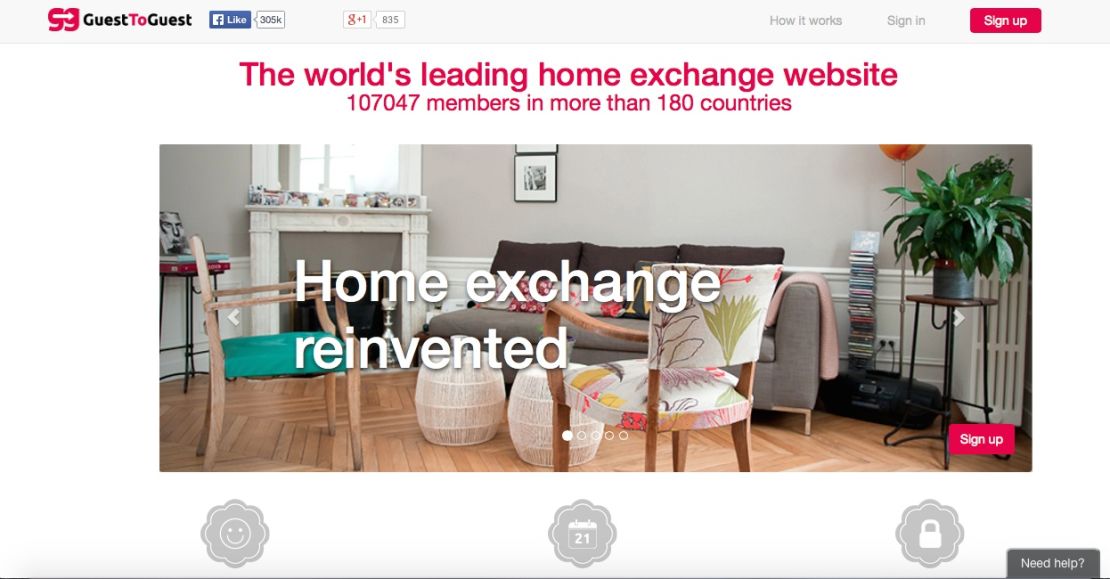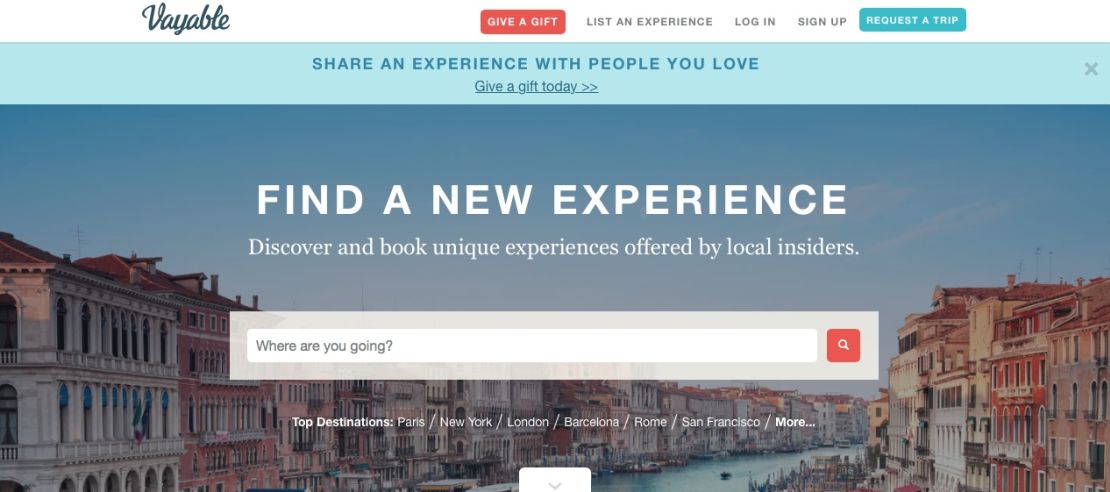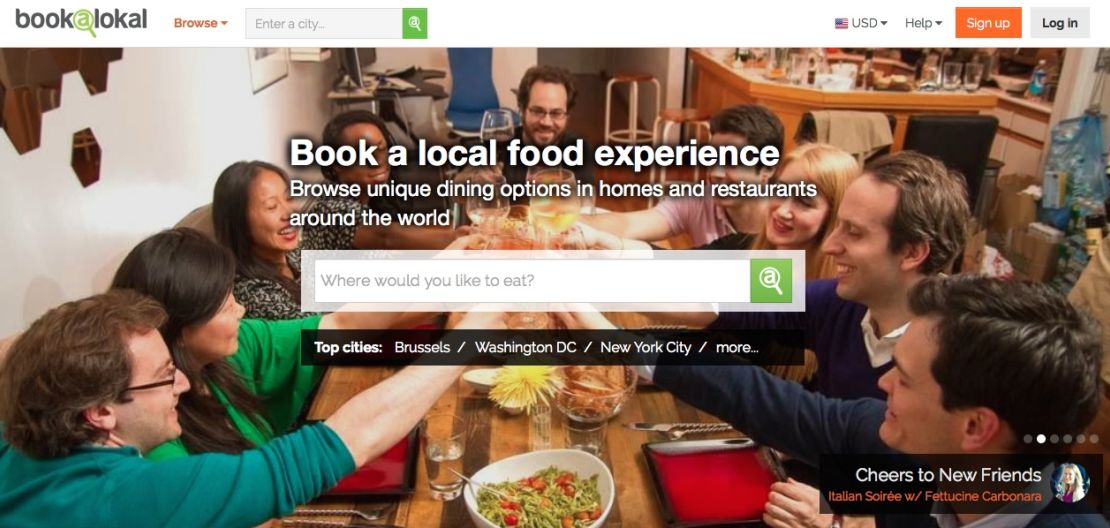Airbnb may be the poster child of the peer-to-peer movement, with more than 800,000 hosts and a valuation in excess of $13 billion.
But it’s not the only platform out there giving tourists the chance to live like locals and locals the chance to make some extra income.
Here are 10 lesser known websites that are tapping into the sharing economy to forever change the way we travel around the globe.
CampInMyGarden.com
If you have space in your garden, why not charge travelers to camp in it?
That’s the simple concept behind Campinmygarden.com.
Launched in April 2011 as a tool to link Wimbledon attendees with local private camping opportunities, the site quickly widened its scope and welcomed more than 1,300 hosts on every continent apart from Antarctica.
“Its a great way for travelers to really get to know an area or even a whole new country – something that a commercial campsite is unlikely to do,” explains community liaison Clare Fairburn.
“The host gets a small fee plus an appreciative guest who will usually share something of themselves.”
The free-to-use website recently debuted many “glamping options,” like yurts, bell tents, shanties and shacks of all kinds. Many provide use of electrical outlets, meals and showers.
Terms and conditions for all locations are negotiated on a case-by-case basis.
GuestToGuest.com

GuestToGuest may be in the business of vacation accommodations, but don’t pigeonhole this home exchange start-up by placing it in the same category as Airbnb.
“Peer-to-peer rentals and swaps are two very different markets,” co-founder Emmanuel Arnaud says. “One of the tenants of the service we’re offering is that there will not be a rental, a fee or any money changing hands between the host and guest.”
GuestToGuest shook up the traditional home swap market when it launched three years ago by offering a point system that provides motivation to lend a home, while eliminating the need for a direct exchange with another user.
Joining is free, but most members pay for optional services like insurance and verification.
Arnaud sees GuestToGuest targeting middle class families traveling domestically, or those for which the economic incentive of not having to pay for where they stay is a huge help.
It’ll soon be available in seven languages, and just reached 100,000 members in 187 countries.
RVShare.com
RVshare believes the average family’s recreational vehicle (RV) sits unused for approximately 90% of the year.
All the while, there are families nearby who may be eager to rent an RV and get a taste for the open road.
The Akron, Ohio-based company launched a peer-to-peer marketplace in January 2014 with the goal of helping RV owners turn a huge expense into a revenue generator.
Or, at the very least, offset the burden of ownership.
“The RV rental industry was screaming for an overhaul, for something to bring it into the modern Internet age,” says co-founder Joel Clark.
“Before RVshare, anyone who wanted to rent out their RV was simply responsible for too much of their own infrastructure.
“Our goal is take all that infrastructure management off their hands so they can focus on taking the best possible care of the people that depend on them for the quality of their trips.”
RVshare supplies renters with the rental demand, marketing and management software.
It’s in the process of rolling out new review, payment processing and turnkey insurance systems.
Currently available only in the United States, it plans to expand “in the very near future” into Canada, Australia, New Zealand and the UK.
Boatbound.co
Boatbound is a free-to-join boat rental marketplace that launched in San Francisco in 2012, offering a new way to lure travelers onto boats for everything from water sports to fishing and cruising.
Founder Aaron Hall says the peer-to-peer website not only lets boat owners offset their ownership costs by renting to pre-screened, qualified renters, it’s also changing boating demographics and expanding the total available market.
“Younger people are getting out on the water in incredible numbers and at significantly higher rates than the industry average,” he says, adding that those aged 25 to 34 make up 34% of Bountbound’s renters.
Boatbound has nearly 10,000 boats across all 50 U.S. states, with plans to expand internationally this year.
Each rental includes up to $3 million in insurance protection, as well as on-the-water towing and support from BoatUS.
Spinlister.com
Have a bike lying around that you’re not using?
Or perhaps you’d like to rent a bike locally on your next vacation?
Either way, the peer-to-peer bike rental platform Spinlister may have you covered.
“Say you’re traveling to San Francisco and you know you’re going to be staying in the Mission District. You could download our app, look up the location where you’ll be staying, and see all of the bikes that are available in that location,” says Andrew Batey, Spinlister chief marketing officer.
“You can easily filter by the type of bike, your height, price range and something that includes a lock and a helmet, and it will show you all the bikes that match your criteria plotted out on a map.”
Renters waive the right to sue listers, accept responsibility for the condition of the bike, and acknowledge they’re responsible for themselves while riding.
On top of that, every bike is insured for $10,000, so if it gets stolen or damaged, the lister is covered.
Spinlister launched in New York in 2012, opened up worldwide in 2013, and now has listings in more than 50 countries.
While its main focus is peer-to-peer bike rentals, surf and snow sports equipment recently joined the mix.

Vayable.com
Ever wanted to fish with a Fijian king, scout for street art in Berlin or train to become a ninja in Japan?
Vayable can arrange all three, along with thousands of other opportunities to avoid the beaten path and get local.
At its heart, the website says it’s a marketplace for people to buy and sell “experiences.”
It launched in San Francisco in 2011 and has grown organically to a platform with more than 10,000 offerings in 900 cities.
Vayable founder Jamie Wong said the plan for 2015 is to make the website more aspirational and accessible to users both before they book an excursion and after the excursion ends.
“We want to create a more content-rich experience on our site, incorporating more videos and photography,” she says.
“The purpose of that is to find more ways of highlighting our insiders and share their stories.”
Keteka.com
Keteka is a travel website formed in May 2014 by two former Peace Corps volunteers who had worked in community-based tourism in rural Panama.
The pair wanted to find a way of connecting vacationers with adventure travel opportunities that have positive impacts on developing communities.
Co-founder Kyle Wiggins says the start-up leverages its connection to a global network of local experts in order to connect travelers with authentic local experiences they can book online.
“At Keteka, we aim to do two things,” Wiggins says.
“One: Provide travelers with a reliable, safe and easy way to book unforgettable authentic experiences in the countries they visit.
“Two: Provide a useful and effective tool for local tour operators to benefit from the positive impact of tourism.”
Keteka is primarily focused on Latin America, but ultimately plans to support sustainable tourism in developing communities throughout the world.
EatWith.com
“Peer-to-peer dining” was named one of 2015’s biggest travel trends by Euromonitor International.
Researchers said that websites fostering this trend are expected to “follow in Airbnb’s footsteps,” pioneering a new branch of the sharing economy.
EatWith may only be two years old, but it’s considered one of the grandfathers of this movement, linking travelers with home cooks in more than 150 cities around the world.
“The idea is to bring people together one meal at a time,” says co-founder Guy Michlin. “We also want to empower and elevate our chefs and allow them to make some extra money from hosting people.”
EatWith has a strict vetting process for its hosts and claims to accept only 3 to 4% of applicants.
In return, diners can expect to pay an average of $40 each for haute cuisine, personalized attention and a one-of-a-kind local experience.
Bookalokal.com

Bookalokal launched in Brussels in 2013 and now claims hosts in 46 countries.
It’s similar in many ways to EatWith, but offers a greater range of food-related activities, including cooking classes, food tours, wine tastings and workshops.
“Other sites really emphasize the food, we try to emphasize the local,” says founder Evelyne White.
“We’re more of a marketplace, and we have a wide breadth of food experiences.”
Bookalokal users can offer their services in anything from a city apartment to a small cafe or specialty food shop, so long as it’s independently owned and operated by the host.
Guests, meanwhile, pay between $30 and $50 for a deep dive into the local food culture.
DogVacay.com
Have you ever returned from vacation to find a depressed dog and a massive kennel bill?
That’s exactly what happened to Aaron Hirschhorn a few years back, spurring him to launch DogVacay in 2012.
The site harnesses the power of the sharing economy to place dogs with reliable caregivers nearby.
The caregivers are required to send pet owners daily photo updates of their happy and healthy pooches, but can otherwise set their own rates and stipulations for their services.
“We want our guests to feel 100% comfortable, and that’s why we include pet insurance, 24/7 customer care and $3 million liability protection for our hosts,” Hirschhorn says.
“Most importantly, we perform a five-step vetting process that includes reference checks, a background screening and a phone interview for all our hosts to ensure they are the right fit for our community.”
DogVacay counts more than 20,000 hosts across the United States and Canada, and launched a sister site, CatVacay, in March to offer felines the same services.
Mark Johanson is a freelance travel and culture writer based in Santiago, Chile. You can follow his adventures at markjohanson.com.









